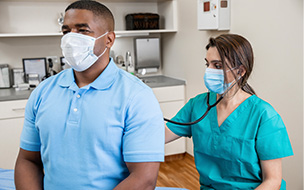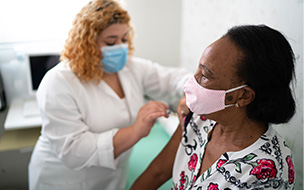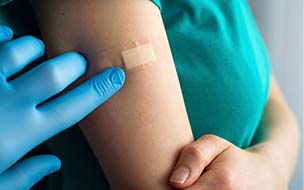| Generation | GEN Z | Millennials | GEN X | Baby Boomers | Silent Generation |
|---|---|---|---|---|---|
| Age Range | 18 – 25 | 26 – 40 | 41 – 56 | 57 – 75 | 76 – 93 |
| Health Risk Factors | Cervical cancer High cholesterol Melanoma Mental health Testicular cancer |
Cervical cancer High cholesterol Reproductive difficulties Skin changes Stress Weight gain |
Breast cancer Colon cancer Heart disease High blood pressure High cholesterol |
Breast cancer Colon cancer Heart disease High blood pressure High cholesterol Osteoporosis Prostate cancer Stroke |
Arthritis Breast cancer Diabetes Heart failure High blood pressure Osteoporosis Prostate cancer Stroke |
Take Control of Your Health
When you build a relationship with a trusted primary care provider, they will get to know your medical and family history, your risk factors for certain medical conditions and your lifestyle priorities. This comprehensive understanding of you as a person helps your provider manage any chronic conditions you might have; recommend age-appropriate screenings to find potential problems early when they are most treatable; and, keep you up-to-date on vaccinations that can prevent disease.
Find a doctor that is right for you
Understand your family health history and known risk factors
Schedule regular checkups and screenings
Stay on top of your vaccine schedule
Establish good habits
Goals to Get You On the Path Toward Better Health
Setting realistic, achievable goals is a great way to start building a healthier lifestyle. Roy Buchinsky, MD, UH Director of Wellness explains how to get started.
Establishing Care with A PCP
Whether you’re looking to find a new primary care doctor or seeking one for the first time, the best preventive care is outstanding primary care. We believe forming a trusting relationship with a primary care provider (PCP) is the best way to preserve and protect your most valuable asset – your health. Your provider will get to know you as a whole person – your lifestyle and health goals, your family medical history and your risk factors for certain conditions, including heart disease, diabetes and cancer.
Health Risk Factors by Generation
There are many health conditions that become more common as we age and others that can arise at any stage of life due to genetic factors. This is why it is essential to discuss your family history with your provider - knowing if you have any genetic predispositions to certain diseases will help them tailor the types and frequency of screenings that are recommended for you.
Preparing For Every Milestone
Your Guide to Health Screenings by Age
Whatever your age or stage of life, prevention is the best medicine. Health screenings are important for detecting and preventing diseases and managing risk factors.
| Age | Timing | Screening |
|---|---|---|
| Breast self-exam | ||
| Blood pressure, height, weight, body mass index (BMI) Breast self-exam Cardiovascular evaluation Comprehensive physical exam Depression screening Skin cancer screening Human papilloma virus (HPV) tests |
||
| Blood glucose test Eye exam Pap test |
||
| Cholesterol | ||
| Sexually transmitted diseases (STD) tests | ||
| All of the above screenings, plus the following: | ||
| Mammogram | ||
| Cholesterol | ||
| Colonoscopy | ||
| All of the above screenings, plus the following: | ||
| Bone density test Thyroid panel |
||
| Cardiac calcium scoring Hearing test |
||
| All of the above screenings, plus the following: | ||
| Dementia and Alzheimer’s screening | ||
| Age | Timing | Screening |
|---|---|---|
| Testicular self-exam | ||
| Blood pressure, height, weight, body mass index (BMI) Cardiovascular evaluation Comprehensive physical exam Depression screening Skin cancer screening Testicular cancer screening |
||
| Blood glucose test Eye exam |
||
| Cholesterol | ||
| Fertility testing Sexually transmitted diseases (STD) tests |
||
| All of the above screenings, plus the following: | ||
| Cholesterol | ||
| Colonoscopy | ||
| All of the above screenings, plus the following: | ||
| Cholesterol Low-dose lung CT scan |
||
| Cardiac calcium scoring Hearing test |
||
| Bone density test | ||
| All of the above screenings, plus the following: | ||
| Dementia and Alzheimer’s screening | ||
| Abdominal aortic aneurysm (AAA) Prostate specific antigen (PSA) screening |
||
Please note these are screening recommendations are a baseline and certain medical conditions and health risks might require additional screenings. Talk to your healthcare provider.
Learn More on Age-Appropriate Screenings
Recommended Vaccinations by Age
Vaccinations are a valuable, science-based tool for the prevention of disease. Many adults are not aware that even though they received all the childhood immunizations, they may still need boosters to maintain protection. Also, as we age, certain diseases like shingles and pneumonia are more likely to occur and can, in some people, pose a serious health threat. Being vaccinated can prevent or lessen the severity of disease in people of all ages. Talk to your primary care provider about your immunization history and which vaccines are recommended for you and your family.
| AGES | 20s, 30s & 40s | 50s | 60s |
|---|---|---|---|
| Vaccine & Frequency | |||
| COVID-19Two dose series given 3-8 weeks apart. Plus one or two booster(s) depending on age. | |||
| Hepatitis A (HepA)After discussion with your healthcare provider. | |||
| Hepatitis B (HepB)After discussion with your healthcare provider. | |||
| Human papilloma virus (HPV)Three dose series through 26 years old. For 27 - 45, after discussion with your healthcare provider. | |||
| Influenza (flu)Yearly | |||
| Measles, mumps, rubella (MMR)One or two dose series, 28 days apart depending on age (if born in 1957 or later), have no previous infection and/or pose a risk of being exposed to measles and mumps. | |||
| Pneumonia (Pheumovax)One dose of Pheumovax. If dose was given < 65 years old wait 5 years before next dose. (Certain health conditions might require a one or two dose series before 60. Talk to your provider.) | |||
| Pneumonia (Prevnar 20)One dose of Prevnar 20. Only given once in a lifetime. | |||
| Shingles (Shingrix)Two dose series given 2-6 months apart. | |||
| Tetanus, diphtheria and pertussis (Tdap)One dose of Tdap, then Td or Tdap booster every 10 years. One dose per pregnancy between 27-36 weeks gestation. | |||
| Varicella (Chickenpox)Two dose series, 28 days apart depending on age (if born in 1980 or later) and no previous infection. |
Get the Flu Vaccine. Your Heart Will Thank You
Getting your annual flu vaccine protects you from developing serious respiratory symptoms. But did you know it can also protect your heart?
Learn More













